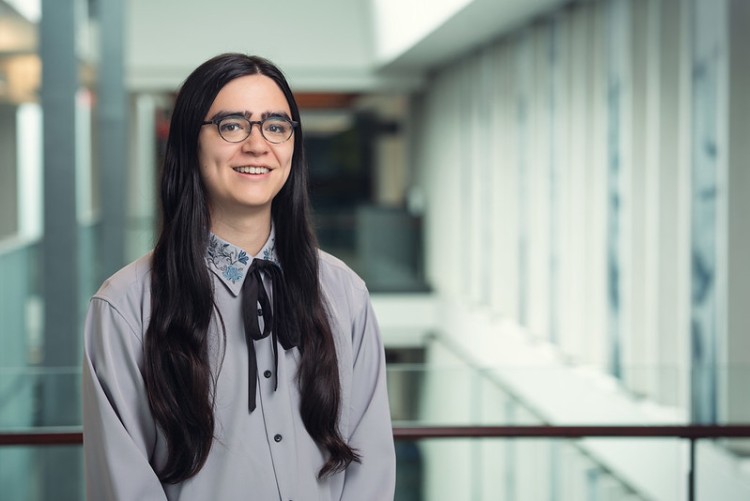At UBC Sauder, faculty members are more than just ‘professors.’ They conduct impactful research that is changing how society views the world while also inspiring students to pursue their academic passions and become the thoughtful, values-driven leaders the business world needs. This year, UBC Sauder welcomes ten new lecturers and tenure-track faculty to the school. In this article, we introduce you to Shin Oblander, Assistant Professor in the Marketing and Behavioural Science Division.
Where are you from, and what brought you to UBC Sauder?
I was born and raised in Portland, Oregon, but have lived in the Northeastern US for the last 11 years, first to do my undergraduate degree at Penn (Wharton) in Philadelphia and then my PhD at Columbia in New York. For me, coming to Vancouver is a return home to the Pacific Northwest, closer to my family. What drew me to UBC Sauder is the unparalleled collegiality of the Marketing and Behavioural Science Division, as well as the supportive environment of UBC Sauder and the university as a whole. Not to mention the location is just unbeatable.
What are your areas of research or your fields of expertise, and how did you get into this field?
My area is quantitative marketing, meaning I develop and apply quantitative models to understand how consumers make decisions. My main interest is in methods for analyzing data, including statistical/econometric methods, machine learning methods, and the intersection between them. A professor I was close with at Wharton convinced me that marketing was a great field where I could combine all of my interests, and he was right.
In my dissertation, I used a combination of machine learning and econometric methods to understand how people make competitive decisions and how optimal their decisions are relative to game theory predictions––and applied my methods to data on competitive Pokemon players. Few other fields would have allowed me to pursue such an intersection of interests.
What continues to fuel your research or interest in these areas?
Bigger data and more powerful computers continue to expand the frontier of what is possible for researchers to analyze and understand. With this, it is essential to keep developing appropriate and scalable methods that can take advantage of these advances so that researchers can keep up. Tackling these problems keeps me excited.
What inspires you to teach?
I have been impacted by teachers in so many ways throughout my life, both academically and personally, and this was a big part of my inspiration to become an academic. I always hope to show students that technical subjects can be intuitive, useful in everyday life, and maybe even fun. I believe in taking an evidence-based, student-centred approach to pedagogy to help students develop critical thinking skills. Hearing former students tell me that I’ve made quantitative topics less scary to them, or that I’ve helped equip them with the tools needed to analyze real-world problems, makes it all worth it to me.
What’s one of the most interesting things you’ve discovered through your research or through your educational journey?
In 2023, I published a paper in Marketing Science with my co-author Daniel McCarthy (University of Maryland) where we found that customer spending pattern shifts driven by the COVID-19 pandemic (e.g., shifts from brick-and-mortar to online retail) were largely transient, but changes in spending at subscription-based businesses (e.g., gym memberships, meal kit services like HelloFresh) were more persistent. These results were featured in the Wall Street Journal twice.
One of our favourite results was that online furniture shopping (e.g., Wayfair) actually dropped to almost 50 per cent below pre-pandemic trends after an initial boost. We took this to suggest that the pandemic didn’t just shift people from offline to online channels, but also shifted purchases forward in time, exaggerating the overall effects of the pandemic on spending, especially for durable goods.
What do you believe is the future of your industry?
For marketing academics, the drastic changes in how we consume––and how firms market to consumers––over the past decade has presented exciting opportunities to analyze new, rich forms of data that can provide deeper insights into how people make decisions than ever before. At the same time, the marketing industry increasingly has a bad reputation due to concerning trends such as privacy invasion, misinformation/deceptive marketing, and so-called “enshittification.” I believe a key imperative for the academic field of marketing, then, is to leverage these insights to play a role in reshaping marketing practice with a focus on sustainability, social responsibility, and ethics.
Can you tell us an interesting fact about yourself?
I’m obsessed with trains and I love urbanism, public transportation, and infrastructure. I don’t drive. Whenever I visit a new city, I make a point of “trainspotting” and riding the local transit system. My office wall is covered with rail maps for Tokyo, New York, and Vancouver. I actually contributed a bunch of footage for this video about Tokyo’s rail network, created by Canadian transit YouTuber RMTransit. Eventually, I hope to ride The Canadian from here to Toronto.
What are you most looking forward to in Vancouver?
Living in the University Neighbourhoods, I am loving the proximity to the forest and ocean, as well as the walkability, bikeability, and transit accessibility (though I do miss the NYC subway––the SkyTrain extension to UBC can’t come soon enough!). Once the spring and summer roll around, I’m excited to explore more outside of Vancouver proper, including hiking in the mountains as well as other beautiful destinations throughout British Columbia.

